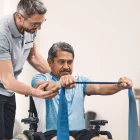In the back, bones, joints, ligaments and muscles are complicated structures. Ligaments, muscle tightening, disc rupture, nerve compression and joint irritation can lead to a stiff back. While sports or accidents can cause back pain, the simplest of motions can sometimes produce painful results. Risk factors like arthritis, poor posture, sleep, obesity, and emotional stress can lead to back pain or make it complicated.
While it is true that a disc disorder, chronic condition or ageing process can cause stiffness in the back, stiffness could also result in a muscular problem that might not even be in your real back.
Here are some muscle conditions which can cause stiffness in the back:
Ruptured disc : The curvature of your lower spine can have an effect on your hamstrings, which can disrupt your spine’s precision with your pelvis. Because physical activity, injury or failure to stretch before and after exercise affects your hamstrings and ultimately resulting in a stiff back, A physical treatment provider like Orthocure, a spine clinic in Gurgaon, can help you with some basic movements if you need help to get started.
Tight hip: Long-term sitting increases the pressure on your spinal discs, causing the muscles in your upper back to losing strength, and can reduce the nutrient supply to your spinal tissue. Avoiding long-term stiffness and pain can be calmed down by sitting down and performing several basic movements and stretches to keep your muscles working.
Spine problems: Below is a list of some other common causes of strain.
Ruptured discs: This means that the discs between the vertebrae are smoothing and bulging out or broken.
Sciatica: This is a form of radiculopathy involving sciatic nerve compression running down the back.
Spinal stenosis means that the spinal column becomes narrow, and the spinal cord is put under pressure.
Spondylolisthesis: When the vertebrae from the lower back pinch the nerves in the neighbourhood.
Arthritis: An inflammatory condition that affects the entire body and the back of the joints.
Take doctor’s appointment if:
Your back rigidity lasted over a few weeks.
It is too hard to do your usual activities because of your back stiffness.
In the morning, your rear rigidity is particularly severe.
In areas, particularly muscles or joints, you notice pain and steepness.
Arthritis or any other condition has previously been diagnosed, and your symptoms get worse.
If the pain causes significant problems and stops you from going through typical working and life, your doctor will look at you and ask you questions. These questions help you to predict how much more help you need with your stiff back. Orthocure refer you to physiotherapy to have early treatment, help with pain and return to normal activities if you need further assistance. We assist in identifying the cause of your stiffness and formulate an underlying condition treatment plan.





